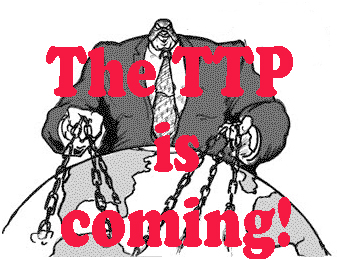By Kate Aronoff for Waging Nonviolence
Suppose for a moment that the Trans-Pacific Partnership — “NAFTA on steroids” — would not spell colossal disaster for the environment. Pretend that it wouldn’t empower unelected corporate tribunals to gut basic regulations in the name of “investors’ rights,” open the floodgates to near-unlimited fossil fuel export and extraction or, very likely, block subsidies for renewable energy development. Imagine that it even offered a few benefits for the environment — crumbs, sure, but crumbs in an otherwise crumb-less world, policy-wise. Those benefits could be a couple thousand acres of wildlife protection, an expansion on safeguards for endangered species or maybe even a guarantee not to drill on public lands. In terms of the trees, air, water and wildlife, the Trans-Pacific Partnership, or TPP — in this aggressively fictional scenario — is a win for the planet.
Like I said, pretend.
Now, keep everything else about today’s situation the same. Having been agreed to in Atlanta on Monday by the United States and 11 other Pacific Rim nations, the TPP has drawn the ire of just about every major labor union in the country. United Steelworkers’ President Leo Gerard has predicted the pact could deal a “final blow to manufacturing in America.” His counterpart at the Communications Workers of America, Chris Shelton, has called it “a bad deal for working families and communities … a corporate dream but a nightmare for those of us on Main Street.” Leading legal experts and economist Joseph Stigltiz express their “grave concern” about its penchant for extra-legal judicial channels, while Paul Krugman (a “lukewarm opponent”) pragmatically explains that “the big beneficiaries” of the TPP “are likely to be pharma companies and firms that want to sue governments.” Given all this — as someone who cares deeply about the environment — would you support it?
Wooed by an even more watered down version of this fantasy, the Nature Conservancy and World Wildlife Fund did just that. As the New York Times dutifully reported earlier this week, they “praised” the deal for supposedly limiting wildlife trafficking and illegal fishing, rendering animals just about one of the only things protected under the agreement aside from corporate profits — and even that’s debatable. The Obama administration has been eager to use the support of these environmental groups as a tool to bolster public opinion for the TPP, writing in a White House blog post that it represented “a once-in-a-generation chance to protect our oceans, wildlife and the environment.” Similar tactics were used to pass NAFTA in the early 1990s, when Bill Clinton “greened” the trade agreement to eek through a deal with Canada, Mexico and his more skeptical colleagues in the United States.
Thankfully, these Big Greens are in the minority when it comes to the TPP. The majority of environmental organizations — the Natural Resources Defense Council, Sierra Club, Friends of the Earth, 350.org — have come out against the deal, citing that it would “[hand] even more power to Big Oil, letting massive corporations throw tantrum lawsuits at governments that dare to scale back emissions.” The interests of workers and environmentalists here are indubitably aligned, along with those of Internet freedom activists and myriad other grassroots outfits that have fought the TPP these last few years.
Despite this week’s news, the passage of the Trans-Pacific Partnership is still far from a done deal. Its full text won’t be publicly available for another month. From there, it will take Congress at least three to four months to introduce legislation that would implement it. In driving forward the next phase of resisting the TPP, the Fight for the Future has assembled over 100 groups, ranging from Code Pink to the ACLU to Food & Water Watch, to oppose the deal as it moves through the House and Senate.
In its sheer awfulness, the TPP has created an alliance powerful enough to force Hillary Clinton into backing down from her support of the deal, which CNN counts she went to bat for some 45 times as secretary of state. Importantly, this fight has also alienated Big Greens from the rest of the movement, helping further define the boundaries of environmentalism’s mythical big tent.
An environmentalism that stands behind the TPP is no environmentalism at all. And it certainly isn’t helping build the broad-based movement needed to keep fossil fuels in the ground, and carve out some chance at averting the kind of catastrophic warming climate scientist Kevin Anderson calls “incompatible with an organized global community.” Horrible as it is, the TPP offers a sickly elegant argument for why green groups can’t work in a vacuum. The same deals that strangle democracy also give corporations near-unlimited access to countries’ fossil fuels, which, of course, can’t be profitably extracted without workers “free” to slog through long hours at poverty wages. While hardly in its strongest or most progressive phase, this past week has proven that labor can be a better friend to climate activists than corporate Big Greens.
In 2015, it’s not necessarily groundbreaking to say the Nature Conservancy and World Wildlife Fund aren’t society’s best hope for climate justice. In the next several years, however, the fault lines are likely to become less clear than they are with the TPP. In the case of proposals for a revenue-neutral carbon tax, for instance, or tax subsidies for non-unionized solar companies, the calculation moving forward for environmentalists needs to be less about the strictly transactional benefits of a given policy (e.g. how much carbon it will keep in the ground) and more focused on a proposal’s ability to foster a stronger and more dynamic movement. In the long-run, there’s no competition between the two. As the People’s Climate March announced just over a year ago, “To change everything, we need everyone.”






